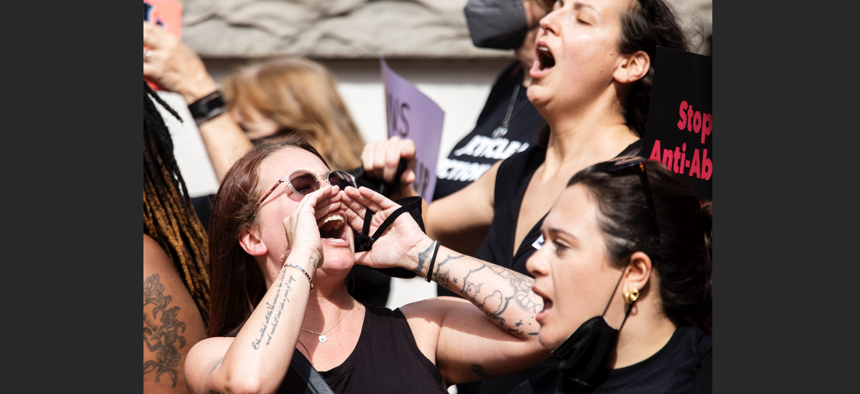Politics
Quiet at the Florida Capitol as rule changes quell dissent
Some groups say they didn't seek permission to protest after new rules made approval less likely.

Kate Dandy-Samitz, left, leads protest chants at the Florida Capitol as advocates for bodily autonomy protest a bill to limit abortions on February 16, 2022 in Tallahassee, before the start of the annual legislative session. Photo by Mark Wallheiser/Getty Images
Changes to Capitol Complex rules governing public gatherings at the Florida Capitol have caused some activists to argue it had a chilling effect on protests and demonstrations.
A new set of rules backed by the DeSantis administration that came into effect this session were meant to limit or prohibit protests or demonstrations inside buildings that were deemed a “disturbance” and are enforceable via arrest. It also changed the process for registering demonstrations, requiring a legislative sponsor to be present during all registered events.
The rule changes led to several arrests this session, including several protestors who staged an unauthorized sit-in in DeSantis’ office. The change came after protests in the Florida Capitol reached a fever pitch during the passing of controversial legislation during the 2022 legislative session. DeSantis’ office has been silent about the policy changes, not responding to requests for comment.
This year, only six demonstration requests were submitted to the Florida Department of Management Services, the body that oversees the Capitol Complex, during the 2023 legislative session, according to data obtained via public records request. Only three of the registered protests were from organizations that are explicitly critical of policies that DeSantis and the Republican legislative supermajority support.
Several organizers said the changes prevented them from holding registered protests, instead having to hold events off Capitol property.
One such demonstration that was held elsewhere because of the was Occupy Tally, a protest coalition of several groups in the city against the six-week abortion ban passed this legislative session. Instead of protesting at the Capitol, Occupy Tally demonstrated outside of Tallahassee City Hall and then outside of the Leon County Courthouse after a run-in with police.
Kat Duesterhaus, a spokesperson for one of the groups that was in the Occupy Tally coalition, said the changed rules required groups looking for protest permits to have a legislative elected official sponsor who was required to be with the group during their entire demonstration. The requirement was an insurmountable obstacle, Duesterhaus said.
“We couldn’t even hold a press conference at the Capital due to DeSantis’ new rules,” Duesterhaus said. “Eliminating free speech at the Capital had a seriously chilling effect during a legislative session that directly attacked the rights of many Floridians. We’re calling 2023 the Anti-Freedom Legislative Session.”
Brandon Wolf, a spokesperson for the LGTQB+ advocacy group Equality Florida, argued that the rule changes were intended to force groups to self-censor their demonstrations, but Equality Florida persisted anyway.
Equality Florida participated in authorized protests this session, including a demonstration organized by the LGTBQ+ youth advocacy group PRISM on March 31. Wolf said the rule changes made it much more difficult to organize this session than in others past. “We are grateful to all who helped us navigate new restrictions so that we could continue to assemble in the Capitol last session and we will not be bullied out of mobilizing Floridians to have their voices heard, because freedom is a value worth defending,” he said.
The rule changes were also criticized by free speech advocates when they were implemented. The Florida First Amendment Foundation denounced the changes, specifically targeting a requirement that events held at the Capitol must “align” with the “mission” of the state.
“Requiring that the user’s event must align with the agency’s mission is an unlawful content-based restriction on free speech,” said Bobby Block, the foundation’s executive director. “People have a right of access to their house to make their thoughts and feelings known to lawmakers whether DMS thinks their presence aligns with their ‘mission’ or not.”
The rule changes also gave the decision on whether to light the old Florida Capitol building solely up to the governor's discretion. That change came after gun control advocates last summer said the state blocked their effort to light the old Capitol orange in honor of gun violence victims. During this session, only two requests were submitted for themed color lighting of the old Florida Capitol.
To some groups, the rule changes were meant to silence opposition while the legislature pushed through controversial DeSantis-backed culture war legislation while issues like property insurance and rising rent prices weren’t adequately addressed. Debbie DeLand, president of the women’s rights and feminist activist group Florida NOW, said the rules directly targeted their right to free speech.
“He (DeSantis) doesn’t care about Floridians, we’re just a casualty in his failing bid for the White House and he’s limited our free speech to try and hide the truth,” she said. “Florida is no longer a free state thanks to this racist, sexist, anti-teacher, union busting, fascist Governor.”
Contact Tristan Wood at twood@cityandstatefl.com and follow him on Twitter: @TristanDWood.
NEXT STORY: Democrat Sheria Griffin to challenge GOP's Corey Simon for state Senate seat
